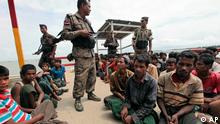14th October 2012,Maung Daw, Arakan- Yesterday (i.e. 13th October
2012) around 4AM, a group of armed Rakhine extremists numbering 20-30
attempted to carry out a terrorist attack on Munshir BarMasjid (Myoma
Kyauk Pali Gyi), the main Mosque in Maung Daw. They destroyed the main
gate and broke into the Mosque at a time when Curfew or Martial Law
imposed in the region was in effect.
“Rakhine terrorists destroyed the main gate and got into the mosque around 4AM. Then, they destroyed the cupboards at the front in the mosque. Fortunately, there were Qurans in the cupboards. Then, they entered the religious school besides the mosque and threw away the Holy Qurans from the cupboards to the ground.
After that, they broke into the room of electricity generator and tried to take out petrol most probably to torch the mosque. When the two people who guard the mosque screamed seeing them, people who live around the area of the mosque gathered. And they had run away before Military came to the place of incidence and their attempt to torch the mosque failed. Later, people found shit in the mosque excreted by those filthy Rakhine extremists” said Nyi Nyi Aung, a Rohingya activist from Maung Daw.
“Rakhine terrorists destroyed the main gate and got into the mosque around 4AM. Then, they destroyed the cupboards at the front in the mosque. Fortunately, there were Qurans in the cupboards. Then, they entered the religious school besides the mosque and threw away the Holy Qurans from the cupboards to the ground.
After that, they broke into the room of electricity generator and tried to take out petrol most probably to torch the mosque. When the two people who guard the mosque screamed seeing them, people who live around the area of the mosque gathered. And they had run away before Military came to the place of incidence and their attempt to torch the mosque failed. Later, people found shit in the mosque excreted by those filthy Rakhine extremists” said Nyi Nyi Aung, a Rohingya activist from Maung Daw.
Since 8th June 2012, all the mosques and Islamic religious schools in Maung Daw have been shut down by the authority. Besides, all the government schools in Rohingyas’ areas have been closed, too. Besides, since the martial law or curfew imposed in Arakan on 10th June 2012, the movement of Rohingyas has been banned and subsequently their access to foods and medicine have also been blocked, while Rakhine terrorists have been set free to do their barbaric acts.



 Bangladesh has started turning Rohingya away
Bangladesh has started turning Rohingya away
 Stateless
Stateless
